Futures Forum: Your takeaway coffee cup is not recyclable
Futures Forum: Your takeaway coffee cup is not recyclable - really
There are solutions being developed:
Four solutions to the disposable coffee cup problem
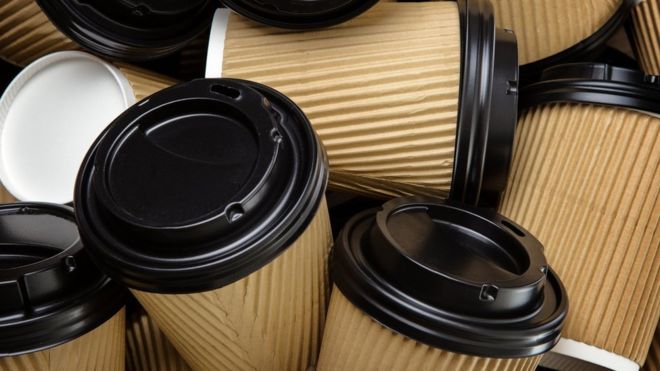 GETTY CREATIVE
GETTY CREATIVE
Since last year, when we were all made aware of the UK's unrecycled cup mountain, some of us have found it hard to buy a takeaway coffee without being wracked with guilt.
In the UK, we throw away an estimated 2.5 billion disposable coffee cups every year. In theory, they are "recyclable", but in practice, only a tiny percentage is dealt with sustainably.
Yet so far, there's no agreed way forward.
Parliament's environmental audit committee has been hearing the latest thoughts from campaigners and industry on how we can improve on our record in this area.
A lot of the biggest names in takeaway beverages, including Caffe Nero, Costa Coffee, McDonald's, Pret A Manger and Starbucks, have signed up to a scheme to collect and recycle more of the current type of cups. Costa is also collecting cups from rival brands in its shops.
But others believe a more fundamental rethink would work better.
Here are four ways the coffee cup waste problem might be tackled.
1. Frugalpac: 'Just change the cups'
Conventional cups can be recycled, but only in special facilities, thanks to the lamination that makes them waterproof.
Frugalpac, based in Ipswich in the UK, manufactures cardboard cups that can be recycled in regular recycling plants.
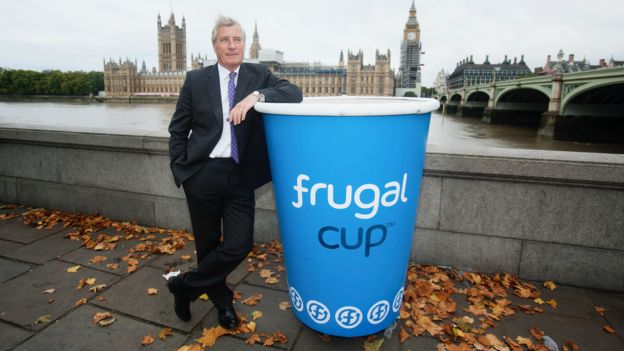 FRUGALCUP
FRUGALCUP
"We looked at this three years ago: everyone was blaming someone else, the cup makers, the coffee shops, councils. We thought, why don't we go out there and solve the problem?" says Frugalpac's founder, Martin Myerscough.
He has a patent for his cup - made of recycled materials, with an only very lightly attached plastic lining (representing about 10% of the weight of the cup), that separates easily during recycling. It's a more pragmatic solution, he argues, than trying to set up specialist collection points for conventional cups, because we already have recycling bins.
He has done trials with independent coffee shops and is working with Starbucks.
Of course, consumers will still have to remember to put them in the right bin, and he is still working on replacing the plastic lid.
2. CupClub: 'Like city bike rental for cups'
Safia Qureshi points to chai wallahs in India as one of her initial inspirations. There, tea is poured into glasses that are washed and reused. We all used to drink milk and Coca Cola from returnable, reusable bottles.
So why not coffee?
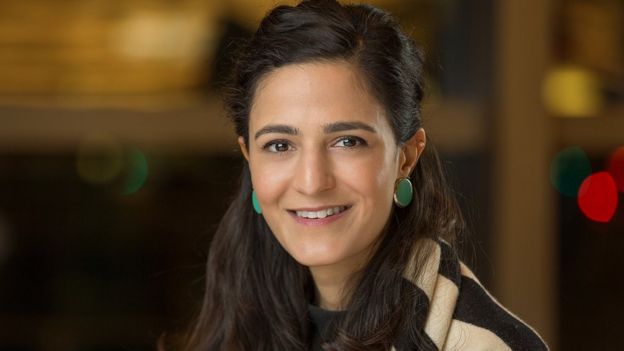 BAILEY-OSCAR
BAILEY-OSCAR
"The current model for reusable cups is that the consumer needs to buy the cup and take it in. The ratio of consumers doing that is 2% of all the total coffee sold," she points out.
Instead, she proposes that the customer joins Cup Club and picks up a reusable cup when they buy their coffee. It can be returned later to one of several collection points. Cup Club is responsible for collecting washing and redistributing the clean cups to participating retailers. Because the cups are tagged and registered to your account - using RFID, the same technology that's on an Oyster travel card - Cup Club can text you a reminder if you've forgotten to return a cup and charge you if you keep it.
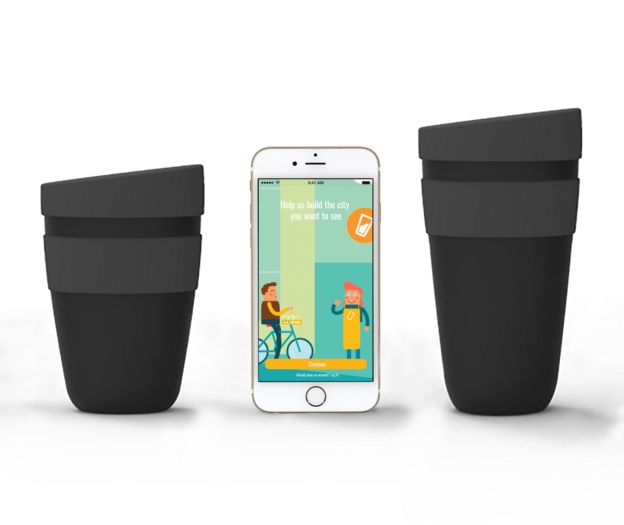 CUP CLUB
CUP CLUB
"I'm very passionate about putting an end to products that are only used one time," says Ms Quereshi "It's a selfish and arrogant stance."
She's starting with company offices and universities, but is aiming ultimately for a London-wide scheme. Its success will rely on enough retailers subscribing, but she has received an Ellen MacArthur Circular Design Challenge award, which will support her in developing the idea further.
3. TrioCup: the origami cup
Tom Chan, an engineering student from Hong Kong studying in the US, said he saw the coffee cups piling up in the rubbish bins outside his university building and wanted to do something about it. He has now patented his TrioCup, a triangular-shaped cardboard cup, with sticking up flaps "like bunny ears". Those ears can be folded down and tucked in to close it.
The entire cup is recyclable and, without the need for a separate plastic lid, potentially cheaper than normal cups.
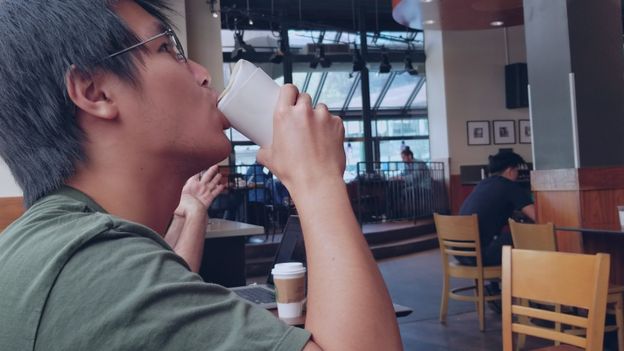 TRIOCUP
TRIOCUP
"I decided if I were to make a new cup, it needed to have more features than just being eco-friendly," he says. So he aimed for some other selling points too, such as spill-resistance.
"From my anecdotal research, a lot more people spill their coffee than you think." He says you can drop a TrioCup from waist height and most of the coffee will stay in the cup.
He thinks the shape makes the cups easier to hold and gives them "a cool aesthetic". Even the origami folding technique is pretty simple, he says.
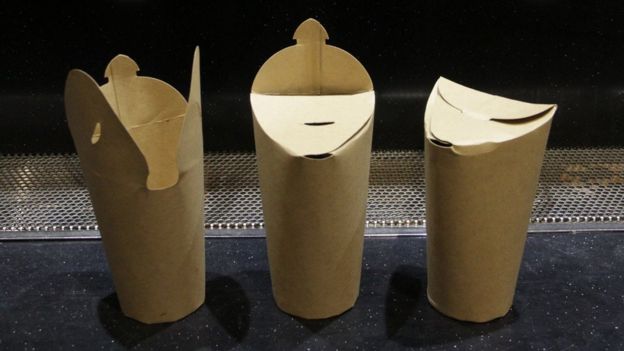 TRIOCUP
TRIOCUP
Next month, Mr Chan, another recipient of an Ellen MacArthur award, will be making several thousand cups per week for use in the university coffee shop.
4. Cupffee: the edible cup
The ultimate waste-free cup, though, must be this: a coffee cup made of cereals that you can munch on like an ice cream cone, once you've downed your drink.
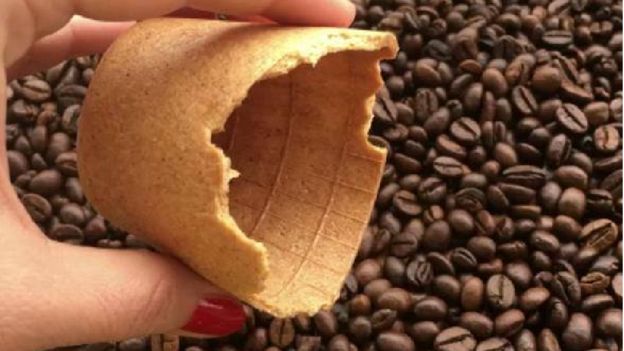 CUPFFEE
CUPFFEE
Three friends from Plovdiv in Bulgaria, Miroslav Zapryanov, Mladen Dzhalazov and Simeon Gavrailov, came up with their "waffle" recipe containing no preservatives, colourings or coatings a few years ago and have been working on commercialising it ever since. Apparently slightly sweet and crisp, it will hold your coffee for up to 40 minutes. And if you decide not to snack on it, it will biodegrade within weeks.
They say they were inspired by a desire to change the world. They might only be changing the diets of a limited number of Bulgarian coffee drinkers, but they are ambitious. The founders say that with a shelf life of six months the Cupffee could meet the needs of the big High Street coffee chains.
But many other firms are thinking along similar lines, at least when it comes to compostable cups. Companies such as Bristol-based Planglow have successfully commercialised what they say is fully biodegradable food packaging, including coffee cups. And they boast clients from restaurants to contract caterers, sandwich shops to Parliament, so policy makers presumably are familiar with this option.
Four solutions to the disposable coffee cup problem - BBC News
.
.
.
No comments:
Post a Comment